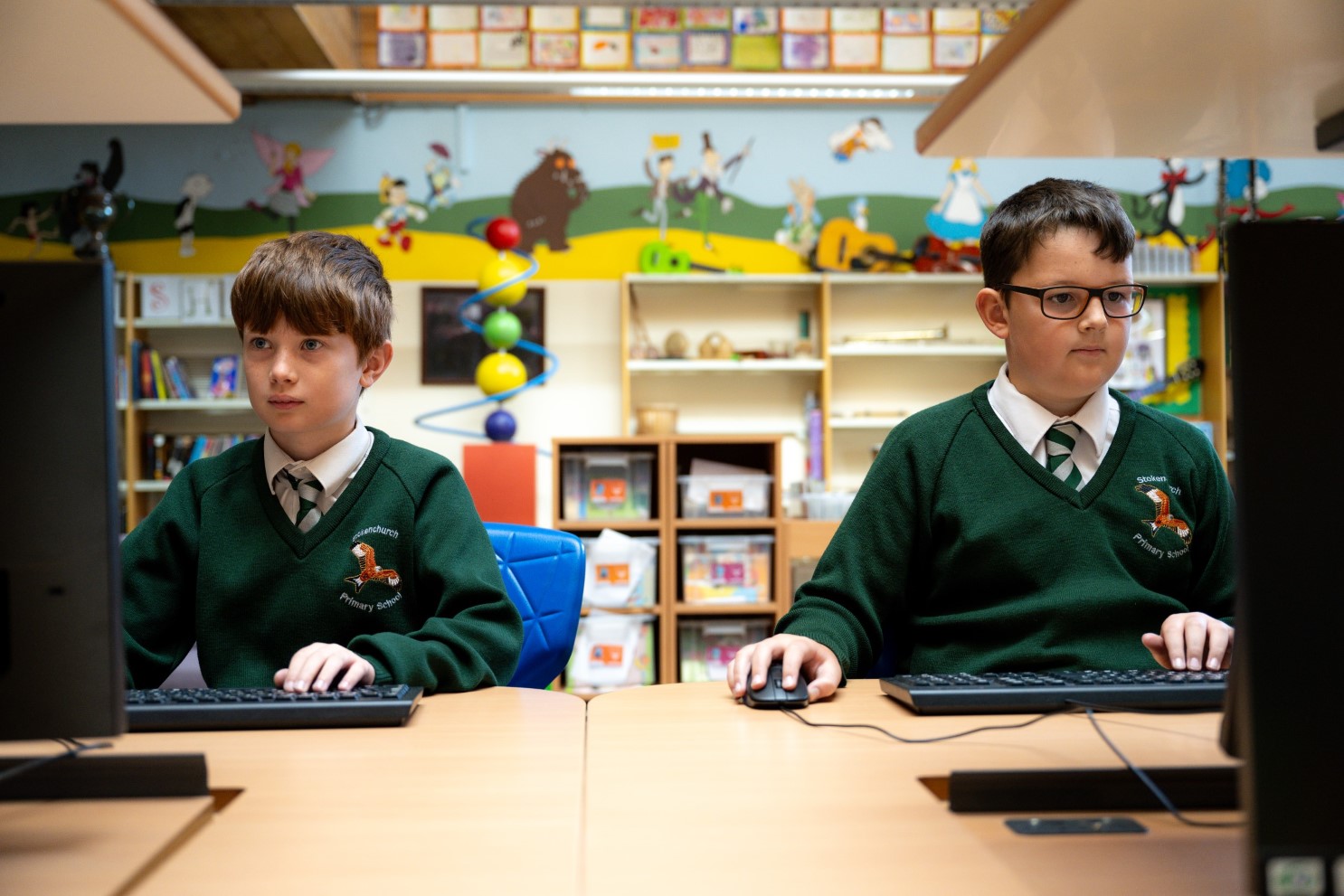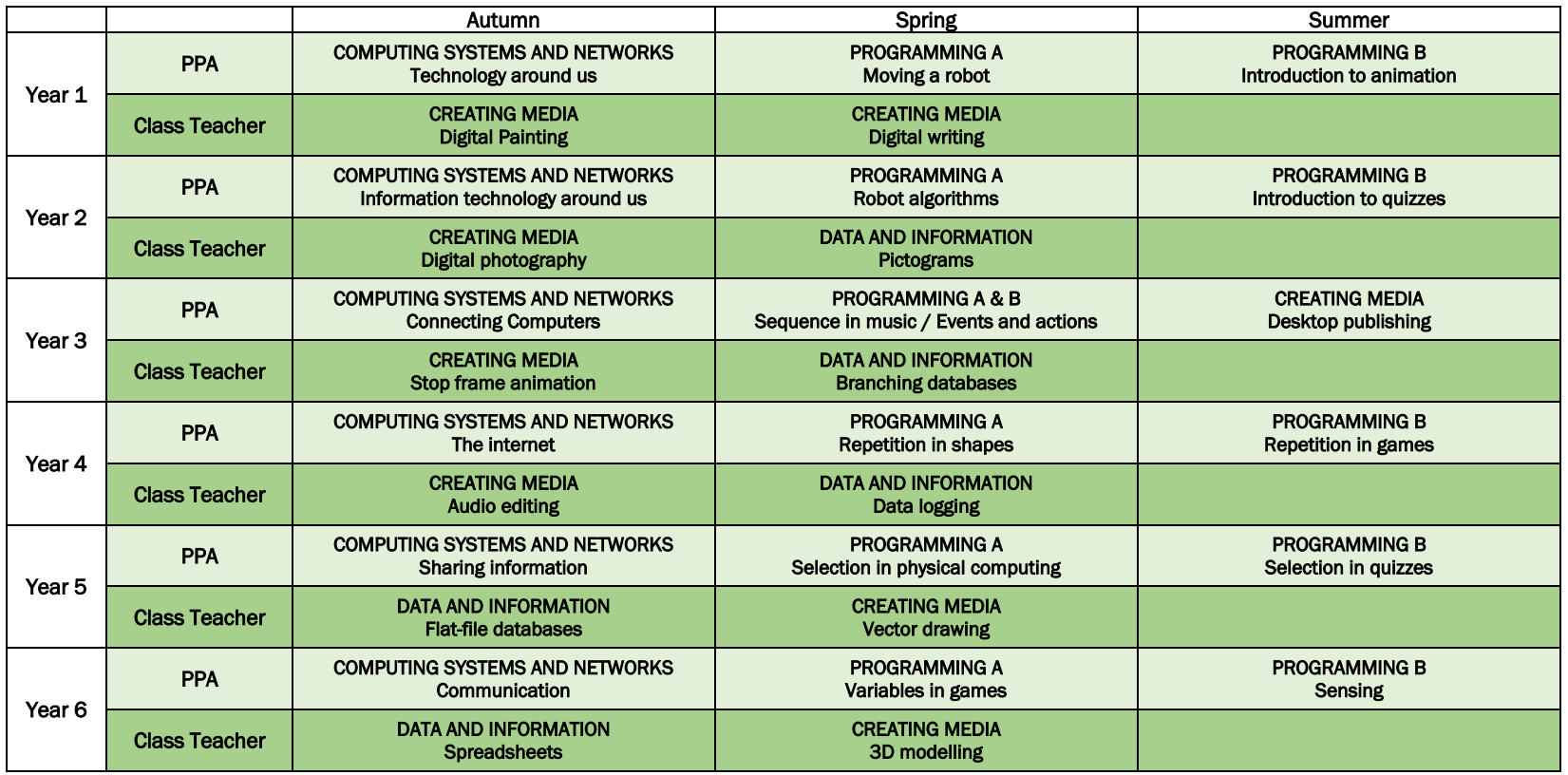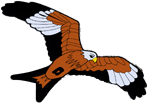Computing
Intent
At Stokenchurch Primary School, we aim to prepare our learners for their future by giving them the opportunities to gain knowledge and develop skills that will equip them for an ever-changing digital world. Knowledge and understanding of ICT is of increasing importance for children’s future both at home and for employment to enable them to become responsible digital citizens.
Our Computing curriculum focuses on a progression of skills in digital literacy, computer science, information technology and online safety to ensure that children become competent in safely using, as well as understanding, technology. These strands are revisited repeatedly through a range of themes during children’s time in school to ensure the learning is embedded and skills are successfully developed. Our Computing curriculum aims to provide children with opportunities to locate, investigate, analyse, share and present digital information with increasing confidence. Our intention is that Computing also supports children’s creativity and cross curricular learning to engage children and enrich their experiences in school.
We use the NCCE Computing scheme of work, Teach Computing, to cover the three areas of the Computing National Curriculum: Digital literacy, Computer Science and Information Technology which is then broken down into ten strands in the Teach Computing taxonomy. These strands (Networks, Creating Media, Data & Information, Design & Development, Computing Systems, Impact of Technology, Algorithms, Programming, Effective Use of Tools and Safety & Security) are revisited each year to build on previous knowledge and skills in our spiral curriculum. We follow ProjectEVOLVE to deliver online safety education to our pupils covering the eight strands from Education for a Connected World. Elements of online safety are also covered within our Teach Computing curriculum and our PSHE lessons. We also take part in Safer Internet Day.

Implementation
Computing is taught in units throughout the year which ensures we provide a progressive and comprehensive scheme of work in line with the National Curriculum. Computing is primarily taught in PPA with each class receiving 50-60 mins per fortnight. In addition, class teachers teach 30 minutes of Computing each week (which can be blocked together across the term) and 15 minutes weekly ProjectEVOLVE discussion.
To enable our children to learn Computing we have access to the following:
- Computer Suite of 36 desktop computers
- Class set of iPads
- additional iPads for loan for SEN use
- BeeBots for EYFS and KS1
- Class set of micro:bits
- Class set of Crumbles
Pupils’ work is saved in a variety of locations, but principally on the school server and in Computing paper folders.
Assessment in Computing involves the following teacher activity:
- Provide opportunities for the children to review and revisit their understanding
- Use the NCCE ‘I can’ statements to inform their teacher judgements and track individual’s progress at the end of each unit
- Use this information to review and adapt the teaching and learning accordingly
Teaching staff are provided with opportunities to develop their subject expertise through access to free training, conferences and network meetings provided by CAS (Computing at School), NCCE (National Centre for Computing Education) and STEM Learning. Whilst Computing is taught discretely, the use of technology is encouraged to support learning across all curriculum areas.
Impact
The success of our Computing curriculum is assessed by both teachers and the Computing Leads in order to inform future adaptations of the schemes of work and help to ensure that progression is evident throughout school.
The Computing leads:
- Carry out staff audits to monitor staff confidence and satisfaction with our Computing curriculum
- Monitor work on digital platforms and within the class Computing folders against each year groups’ long-term plan
- Conduct pupil voice sessions, ensuring children are actively contributing to our curriculum content
We aim that our pupils should:
- Be enthusiastic and confident in their approach towards Computing
- Present as competent and adaptable ‘Computational Thinkers’ who are able to use identified concepts and approaches in all of their learning
- Be able to identify the source of problems and work with perseverance to ‘debug’ them.
- Create and evaluate their own project work
- Have a secure understanding of the positive applications and specific risks (and benefits) associated with a broad range of digital technology
- Transition to secondary school with a keen interest in the continued learning of this subject
Our Curriculum

Computing in EYFS
Computing at Stokenchurch begins with our very youngest children in our Foundation Stage. The children enjoy a wide range of technology throughout their daily continuous provision.
- interactive whiteboards
- lightbox
- Tonie players
- sound boxes
- Bee-Bots
- iPads
We also teach Computing from the Barefoot Computing units of work. These are carefully designed to encourage computational thinking in our children, something they are already naturally doing in their everyday play, and link both to their Early Learning Goals and Characteristics of Effective Learning. The key skills are: tinkering, creating, collaboration, persevering, logic, pattern, abstraction and algorithms & decomposition.
Digital Leaders
At Stokenchurch Primary School, we offer our Year 6 children the opportunity to become Digital Leaders. Our Digital Leaders are children who are passionate about technology and enjoy sharing their expertise with the rest of the school. The role of digital leader is varied and includes:
- Ensuring that they have excellent knowledge of online safety.
- Leading Key Stage assemblies, teaching children how to stay safe online.
- Promoting the use of technology across the school.
- Supporting Key Stage 1 in their Computing lessons.
- Opening up and closing down our Computer Suite each day.
- Reporting any faults to the Computing Leads.
- Assisting staff in preparing technology for lessons.
